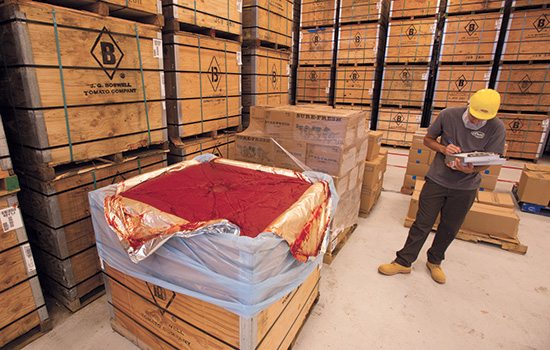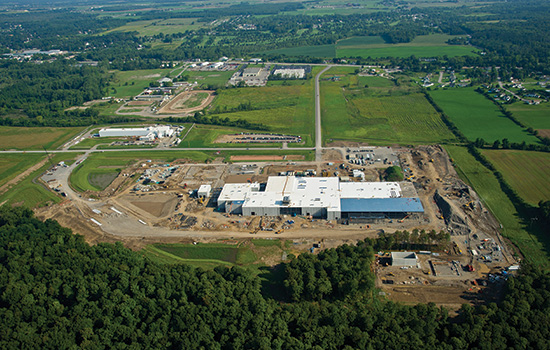From farm to fork
RIT helps food industry become sustainable
James Cavanaugh Photography
The popularity of Greek-style yogurt has resulted in construction of two major production facilities at the Genesee Valley Agri-Business Park near Batavia, N.Y. The Müller Quaker Dairy structure in the foreground will open next year; in back at left is the Alpina Foods plant, which opened in September.
Trains deliver huge quantities of tomatoes and tomato paste to LiDestri Food & Beverage, a Rochester-based company that produces 2 million jars of sauces, dips and beverages daily.
The tomatoes arrive packed in enormous wooden “totes” lined with plastic. The company recycles the wood, but recycling the plastic has been impractical. The bags contain tomato residue. Cleaning them uses a lot of water and puts organic material into the waste water system. The bags present a potential sanitation problem when stored for any length of time.
So the expedient option has been sending them to a landfill—and that’s not what anyone considers desirable.
LiDestri has turned to the New York State Pollution Prevention Institute at RIT’s Golisano Institute for Sustainability for help in finding a better solution. Several ideas are being evaluated, including sending the bags to a company in Niagara Falls that converts plastic into fuel.
“In the food industry, sustainability is a big issue,” says Dennis Burdette, corporate sustainability manager. “By my definition, that means doing business in a way that allows us to keep doing business into the future. We’re always interested in making sure that we’re doing all we can, and connecting with the resources at RIT is very helpful to us.”
LiDestri is one of many businesses that can benefit from the new Finger Lakes Food Processing Cluster Initiative, an economic development project spearheaded by RIT’s Center for Integrated Manufacturing Studies, the technology transfer arm of the Golisano Institute for Sustainability and the New York State Pollution Prevention Institute.
The initiative is an economic development project focused on businesses involved in any aspect of food production—from farm to fork. Nine counties are included in this ambitious effort: Genesee, Livingston, Monroe, Ontario, Orleans, Seneca, Wayne, Wyoming, and Yates.
The project is being funded by grants totaling more than $1.5 million, awarded as the result of a competitive process through the U.S. Jobs and Innovation Accelerator Challenge. Of 125 applicants nationwide, only 20 were approved for funding.
The money comes from three federal agencies: the Department of Labor’s Employment and Training Administration, the Small Business Administration and the Department of Commerce’s Economic Development Administration. The New York State Department of Environmental Conservation is providing support through the New York State Pollution Prevention Institute at RIT.
A number of partners are involved, including Monroe Community College, Genesee County Career Center, Finger Lakes Works, RochesterWorks!, three Small Business Development Centers and the Cornell Agriculture and Food Technology Park in Geneva.
“We knew that partnerships were key,” says GIS Director and Associate Provost Nabil Nasr. “This program is a great example of how regional organizations can leverage their knowledge and expertise to help industry in our community.”
U. S. Deputy Secretary of Labor Seth Harris echoes that belief. “What I have found is where businesses come together with higher education, that’s where you have success,” Harris commented on a visit to RIT in May. “That’s what we have found here in Rochester. It’s a synergy—more innovation creates more jobs.”
While agri-business has always been a foundation of the region’s economy, recent developments have brought it to the forefront, demonstrating potential for significant growth of this sector. A prominent example: Two multi-national companies are constructing major facilities for production of the popular Greek-style yogurt in Batavia, Genesee County. Alpina Foods, the U.S. arm of a South American dairy company, recently opened a $20 million plant producing Greek-style yogurt topped with granola. It created 50 jobs initially.
In August, New York Governor Andrew Cuomo drew media attention with his visit to a $206 million facility being built by PepsiCo Inc. and Theo Müller Group of Germany. Müller Quaker Dairy will open next year with 186 employees and could employ as many as 600 within a few years. It may soon become Genesee County’s largest employer.
The two neighboring facilities, which will buy milk from area farms, are both located in the new Genesee Valley Agri-Business Park, a 202-acre facility established by the Genesee County Economic Development Center.
“We knew what we wanted to go after,” says Chris Suozzi, vice president for business development, Genesee County Economic Development Center. “Looking at the area’s assets, we focused on putting together a public-private partnership to fund the Agri-Business Park and then worked to attract food processors.”
The Agri-Business Park offers businesses numerous incentives, including assistance with permits to accelerate the building process (the Alpina project received a site permit in 21 days; Müller Quaker in 15 days). Tax benefits, abundant space, proximity to transportation and suppliers and ready access to utilities including gas, electricity, telephone and sewer are additional attractions for businesses.
“We offer shovel-ready, one-stop shopping for businesses,” says Suozzi. “When you’re competing with other regions around the country, these incentives can make the difference.”
The Food Processing Cluster Initiative is a bonus, Suozzi says. One prong of the initiative focuses on the training needs of industries, offering customized programs for workers. RIT’s Center for Integrated Manufacturing Studies began working with Alpina to train workers even before the new plant opened. “If you can bring the training in, then it’s a natural to bring the companies in. Therein lies the ‘connect the dots,’ ” says Susan Noble, executive director of The Technology Farm in Geneva, Ontario County, one of the partners in the Finger Lakes Food Processing Cluster Initiative.
In order to grow, companies need skilled workers, and they can be difficult to find in more rural areas, says Noble. There’s a need for training programs to provide specific skills as well as the basics of how business functions. She’s hopeful that the Food Processing Cluster Initiative can take on that challenge.
Established in 2005, The Technology Farm is an innovative incubator for agriculture-related businesses. Currently, the enterprise is home to 12 startup businesses, including Mooseberry Soap Co. (manufacturer of natural soaps), Seneca BioEnergy (which uses grape and other agricultural byproducts to produce biofuel), Top Quality Hay Processors, and Stony Brook Partners (producing cooking oil from squash seeds).
“Part of why The Technology Farm works is that the startups help each other,” says Noble. Besides sharing facilities, the small companies share experience and feedback. It’s a microcosm of how the Food Processing Cluster is intended to work. The initiative can help large businesses or small ones become more successful. The potential is tremendous.
“The Food Cluster brings together a lot of companies that may not seem like they’re related to food—but they are,” says Noble.
“It really is exciting. I can’t see how it wouldn’t succeed.”
To learn more
By the numbers
Rochester/Finger Lakes region food industry consists of:
- Nine counties: Genesee, Livingston, Monroe, Ontario, Orleans, Seneca, Wayne, Wyoming and Yates
- Employment: 13,700 people
- Average annual wage: $39,785
- Total wages: $556,092,350
- Number of food-related businesses: 730
- Largest milk-producing region in New York state
- Second-largest wine producer and third-largest grape grower in the U.S.
 Juliano Amarena checks a container of tomato paste at LiDestri Food & Beverage. The company is turning to RIT for help in recycling the plastic linings from containers of tomato products. A. Sue Weisler
Juliano Amarena checks a container of tomato paste at LiDestri Food & Beverage. The company is turning to RIT for help in recycling the plastic linings from containers of tomato products. A. Sue Weisler













